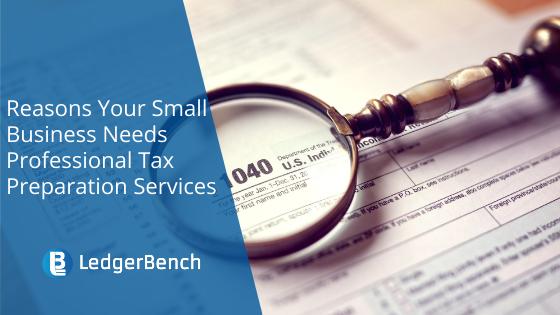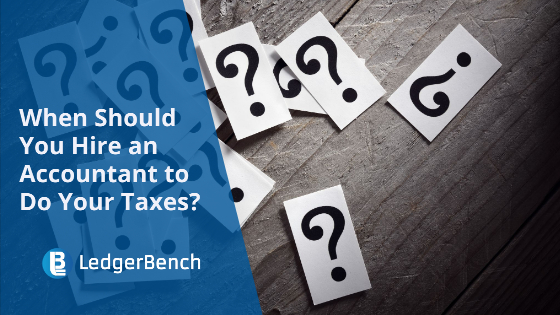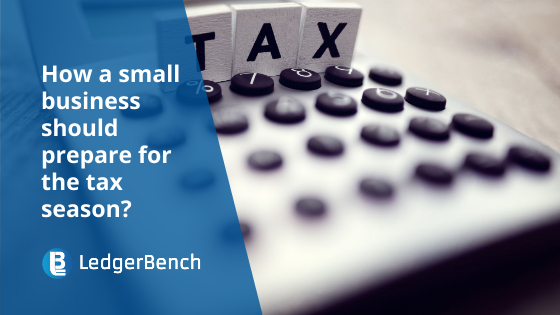
IRS, Tax, Tax Preparation
The demand for professional Tax Preparation Services has continued to increase for many years. Taxpayers are seeking more help than ever because of the Tax Cuts and Jobs Act. Whether you have a small business, freelancer, larger business it’s important to choose a professional tax preparer. Many of the taxpayers are choosing to perform complex tax preparation all by themselves, which is a perilous task. But it is vital to have a tax preparation professional rather than doing the taxes yourself.
We’ve listed legit reasons that will convince you to appoint tax professional for your small business.
Legit reasons why your small business needs professional Tax Preparation Services:
-
More time to grow your business:
Growing and sustaining your business takes time. You invest day and night to grow your business successfully. In the early stages of your small business, you’re the marketer, salesperson, product or service delivery, and everything in between. Accounting may also be part of the above list. However, tax filing can be left to the professionals as it is very important to be prepared correctly. Instead, you must focus on other core activities of the business inorder to grow. Taxes are time-consuming. The IRS estimates that it takes 16 hours to prepare to file a tax return with the long form 1040.
Delegate the task of tax filing to tax preparation services. A tax professional will reduce your time it takes to gather tax documents, forward them to office, review the final return for accuracy and much more. This will also give you peace of mind because filing taxes will not bother you. This will lower your stress and help you become more efficient.
Also Read – A Step-By-Step Guide to Ensure Payroll Compliance!
-
Tax law is too complicated:
No wonder taxes are dreadfully confusing! There are a lot of details, jargons and barrages of numbers. It is common to make a mistake especially if you’re not trained to handle the complicated tax preparation. One mistake in tax filing can be a big deal for your business. One error can trigger the IRS to question you and ultimately you might end up paying thousands in penalties and interest. New tax laws are enacted every now and then, making it tough to keep up with the changes and how they might affect your business.
But an accountant who specialises in tax preparation services will help you avoid mistakes or errors. A tax accountant is trained on complicated tax laws, provisions, policies and tax methods. The accountant knows what should be done and what strategies must be applied. The Accountant must be knowledgeable about the Tax Cuts and Jobs act as well. The TCJA has implemented dozens of changes such as retirement tax policies, excise tax, foreign business taxes, corporate tax adjustment, additional business deductions and reduced tax payments for individuals.
#1 Bookkeeping Services for Small Business
-
Maximize deductions and Tax savings:
There are thousands of tax deductions, credits and loopholes available for taxpayers and you must know which ones apply to you. Obviously, you won’t be spending too much time reading 70,000 pages of the Internal Revenue Code (IRS) to figure it out.
But a tax accountant can help you make the most of the deductions and savings by using their expertise. An experienced tax preparer knows all the tax deductions that your business may qualify for such as employee wages, costs of goods sold, employee health insurance, rent, vehicle expenses and more. With the use of tax planning, you can consult in the areas you can save with your tax accountant.
-
Better understanding of your tax situation:
A business with better understanding of tax situations is wise and rare. Once you’ve started analyzing your business taxes on your own, you’ll need the preparation of tax preparation services. It’s good to know your books and more better to allow the professional to perform the task. A tax accountant specializes in accounting books, testing formulas and understanding taxes at all possible angles. An accountant will never miss the tax deadline or tax detail.
Working with Professional Tax Preparation Services will raise your level of tax awareness. You will understand the importance of tax forms and how far tax deductions can go. You’ll understand how a proper tax service can improve the cash flow of your business.
Suggested Reads – Ways to Maximize your Tax Benefits During Covid-19
Receiving letters from the IRS is a serious concern. If you have tax preparation services, you’ll have peace of mind. Tax professionals are aware how to address IRS letters and concerns. They can formulate counter-strategies and help explain your tax situation to the tax auditor. It’s always advisable to have a tax accountant by your side when dealing with the IRS.
A tax professional does more than just filling your business taxes with the IRS. They keep up with the tax laws to help business plan for the future while remaining compliant with the law and minimizing their tax burden. They also help to resolve issues and change the way a business operates to avoid any issues in the future.
Conclusion:
If you’re trying to get the most out of your tax refund, thus saving the most money possible, you must consider hiring a tax preparer. Have you now agreed with us on how important tax preparation services can be for your small business? If yes, then you shouldn’t wait any longer! Contact us to get our best professional tax preparer to help you. Tax preparers could provide you with every possible deduction and provide considerable financial value.

Accountants, Accounting, Accounting Services, Tax
Preparing and filing taxes can be a real hustle to deal with. Not everyone enjoys preparing their taxes. But one can’t run away from the responsibilities of filing taxes. Every year the tax season arrives and with it comes the complexities of keeping up with the compliance’s along with the workload of handling lots and lots of paperwork.
However, even after knowing that tax preparation isn’t an easy task, many small business owners and self-employed individuals prefer doing it all on their own. And why exactly? Only to save a few bucks. But what they don’t realise is that the value of their time is no less than the value of their money. They spent their valuable time preparing for tax filing. And the sooner they realise this the better. Instead of doing all the hustle and bustle by self, hiring an accountant can be a wise choice. After all, is it always wise to hand over the task to a professional or to make it more relevant, hire someone who does this for a living?
But is there a right time to hire an Accountant to do your taxes?
A question that usually comes up is “When Should You Hire an Accountant to Do Your Taxes?”
Well, let’s find out.
Hiring an Accountant to Do Your Taxes
Paying taxes on-time is every citizen’s responsibility. However, getting tax ready isn’t an easy nut to crack especially if you run a business or are earning more than $500,000 per year. In such cases, it is always wise to hire an accountant who does tax preparation for living. This way you can avoid the penalty of the IRS as well as save your precious hours to invest in your domain.
You’ve recently received an inheritance
There may be cases when you might get your hands on an inheritance. But it can add to your tax filing complexities. Owning an inheritance means you can owe estate tax, inheritance tax or capital gains tax. While you are dealing with the tax complexities of your new inheritance, considering to hire a professional accountant can ease your task. It would be a wise option to let the professional do his/her job.
Also Read About – What is Accounts Payable?
The IRS has contacted you recently:
Be it an individual taxpayer or a business owner filing taxes on behalf of his company, the IRS has the right to contact you in case they find any discrepancies or any other fraudulent activities in your filing. And with little or zero knowledge of the subject matter, such situations can put you in a tough spot. This is another situation where hiring an Accountant can be your best option. An accountant is well aware of the government policies and how they can help you to minimize the penalty in case of under- or over payment.
Planning for your retirement
Hiring personal Accountants can be a great idea to invest in if you are planning for your retirement. These professionals can be any of the following:
- Enrolled Agents (EAs),
- Certified Public Accountants (CPAs) and
- Attorneys
- Registered Tax Return Preparers (RTRPs)
Figure out what your needs are and you want to invest and decide for yourself what’s best for your business. Each of the above highly-skilled professionals can offer you a wide variety of services and solve your various planning and tax return issues..
Consult for Accounting Services for Small Business
Business Advisory:
Over time, the job of an Accountant has always been important to businesses and has evolved into various branches. One such branch is where skilled Accountants can take over business advisory roles for you and help manage your finances with expertise. They can also offer valuable insights on your current financial position and help plan for the future accordingly.
Conclusion:
Accountants affect our everyday lives each day. Millions of jobs depend on an Accountant’s honesty, integrity and professionalism. Therefore, hiring one in times of need is a wise choice and can save you hours of trouble as well as help you deal with the complexities that arise when filing a tax return.

IRS, Tax
Running a small business isn’t an easy task. At each step of the business growth cycle, a new challenge arises. However, one process that remains constant all throughout the business lifecycle, is Accounting and Bookkeeping.
Both these processes are the core financial processes for any business that eventually assist in easing the Tax Reporting complexities. Tax Filing is an yearly process that every business needs to comply with in order to avoid being penalised by the IRS. However, many times small business owners prefer doing their finances on their own which can result in penalties since they lack complete knowledge of the subject.
Here we will be discussing some of the common mistakes that business owners need to look out for, especially if they don’t want to seek professional help:
Underpaying estimated taxes
Lack of proper financial knowledge can at times prove to be costly for business owners. Failure to pay at least 90% of your current year tax bill can result in the IRS penalising your business.The IRS has the right to charge a penalty even if less is paid early or more has been paid later.
Suggested Reads – IRS Tax Relaxation Deadlines for Covid-19 (With State Regulations)
Failure to file penalty/late filing penalty
This penalty can be avoided by simply paying the taxes owed on time. The IRS can charge 5% a month as penalty for late filing which can go to a maximum of 25%. Also, it is interesting to note that even if you aren’t financially stable to pay your taxes, you should at least file your taxes since the penalties for not paying taxes are far lesser.
Failure to pay penalty/late payment penalty:
Yes penalty for not paying your penalties.The IRS can do this too. The failure to pay penalty rate is .5% a month on the outstanding tax balance. However, you can enter into an installment agreement to pay back the taxes owed.
Tax Penalties for Errors or Fraudulent Returns
Mistakes are a human nature and so is fraud and embezzlement. And the IRS has all the rights to penalize your business if they find out you have either knowingly or unknowingly filled false or incomplete information. Moreover, this penalty can be as much as 75 percent on top of the total owed. Therefore, it is very important that you include all your income when filing for tax.
Suggested Reads – COVID-19 | FFCRA Emergency Family Medical Leave Payroll Tax Credit
Not depositing employment taxes
Business owners who have employed individuals must deposit their share of taxes alongwith their employee’s taxes and failure to do so can result in IRS penalties.
Not separating business and personal expenses
There is also a penalty for not separating business and personal expenses since it can make it complex for the IRS to figure out the exact legitimate business expenses. This can further cause auditing complexities.
Words of Wisdom:
Paying your due taxes correctly on time is the simplest way to avoid IRS penalties!!

Accountants, Accounting, Balance Sheet, Tax
Recording financial transactions are the top priority for all businesses. While every financial document has its own importance, a Balance sheet is one that defines the financial health of a business entity at a given point in time. The balance sheet of business contains enough financial data of an organisation to determine the growth of the company as well as predict its future expansion plans.
However, accounting mistakes can lead to discrepancies in the balance sheet that can prove to be costly for businesses. Here we will be discussing some common balance sheet mistakes that even professional Accountants and Bookkeepers can make and to avoid them.
Avoiding Balance Sheet mistakes:
Before we hop on to the discussion straight away, here’s a basic understanding of the formula that a Balance sheet operates upon and how each entity contributes:
Assets=Liabilities+Shareholders’ Equity
- Assets – Anything that the business owns and has monetary value
- Liabilities – It includes the debts a company owes to others
- Shareholder’s Capital or Equity- This includes the total amount invested by the Shareholders
You May Also Read – What is Business Continuity Plan?
Common mistakes:
It is a common balance sheet mistake to miss out on recording transactions like personal expenses, inventory, or any other financial transaction. Even professionals can face this situation where a transaction just slips out of their mind.
-
Recording transactions incorrectly
Mistakes are inevitable and a core part of human nature. Many times, business owners and accountants can be in a spot where they unknowingly record a transaction wrong. Don’t worry you aren’t suffering from Dyslexia if you record 71 as 17. It is a common transposition error and can be rectified easily if you double-check the balance sheet. This is why many business owners prefer cross-checking the entries of their bookkeepers.
-
Missing out on recording inventory changes
Have you forgotten to record inventory changes?
Take it easy, it’s a common balance sheet mistake. At times even the easiest tasks are prone to mistakes. Make sure that you are doing your books on a regular basis since too much work can make Jack a dull boy and he can make such mistakes.
-
Classifying data incorrectly
As discussed earlier, the Balance sheet works on 3 primary entities(assets, liabilities, and equity). Inaccurately classifying your transactions can disrupt the balance sheet formula that it works on and can result in major errors. However, this is one mistake that professionals won’t make generally but in any case, the proper classification of business transactions is imperative to avoid such errors.
Business owners who do their books on their own should re-verify the classification of their transactions with an accountant.
How to avoid balance sheet mistakes
The above-discussed mistakes are pretty common and can create data irregularities within the balance sheet. Here’s how you can avoid them:
- Conduct a trial balance before creating your balance sheet
- Review and update balance sheet transactions regularly and double-check them for common errors discussed above
- Keep your financial documents well-organized to avoid any hassle
- It is always advisable to seek professional help
Summing Up:
From obtaining a business loan to better understand your business performance and liquidity position, a balance sheet is a crucial business asset and its importance shouldn’t be overlooked.
Hire a Professional Bookkeeper of LedgerBench and let the professionals do their job while you do the job you’re best at!!

Accounting, Small Business, Tax, Tax Preparation
Business and tax are two inseparable entities that can’t stay away from one another for long enough. Every year the tax season arrives and with it comes the tax filing complexities. Even though the tax season arrives yearly it is advisable to work on it all throughout the year else you’ll end up creating a mess with excessive workload to handle. In this post, we will take a deeper look into How to do tax preparation for small business for tax season efficiently.
Small Business preparation for Tax Season
-
Keep organized and updated throughout the year
Preparing for tax season isn’t a task that needs to be done only when the filing season is near. It is a process that should be well organized throughout the year. Keeping your financial position up-to date will not only make it easy for you to be well-prepared in advance but also ensure that you have your financial state at your disposal at all times so that you can make business decisions accordingly.
A professional bookkeeper can help small business owners in keeping the financial work organized all throughout the year, making it easy when the tax season arrives.
According to the financeonline.com, “21% of SMB owners feel that they are not knowledgeable enough about accounting and finance”. However, many small business owners avoid seeking professional help when preparing and filing taxes. While small businesses can save a handsome a few bucks if they don’t hire a professional, it can also backfire in many ways. As said above, preparing for tax season is a continuous process that requires tracking and recording of financial transactions throughout the year, SMB owners who prefer taking care of their Accounting and Bookkeeping by themselves can end up making mistakes as well as spend their valuable time doing something that they shouldn’t be doing.
Also, if you hire a professional Accountant who is more qualified to advise you on tax matters, you can save more money than you can lose if you do it by yourself.
Looking for Top Financial Preparation Services?
-
Separate business from personal expenses
While many business owners do spend from their own pockets, they should keep the expenses separate as it not only simplifies the process of managing finances but also helps in claiming tax relief when the tax season arrives.
-
Know which business tax return you need to file
Small Businesses can fall under many different categories like Limited Liability Partnership, Limited Liability Company, Single Member LLC or Sole Proprietor. And each category has it’s different set of rules and tax rates. Therefore, business owners need to classify their business before they go for filing their tax return. Businesses can lose a significant amount of capital as they could end up overpaying taxes, failing to classify their business.
Technology has made our lives easier and the Accounting profession isn’t new to it. Using Accounting software like QuickBooks can help small business owners automate their day to day tasks and keep the financial records organized while they are safe and secure under multi-layer data encryption that accounting software uses.
Summing up:
Tax preparation for Small Business – Preparing for tax season isn’t as difficult as it sounds. All that needs to be done is keep the financial processes well-organized all throughout the year. While business owners have other core responsibilities to handle, they can hire a professional bookkeeper to maintain their books.

Tax, Tax Preparation
Every small business owner wants to save some money. Small business tax deductions can help you save that money. Taxes can be complicated especially for small business owners.
What is a tax deduction?
A tax deduction also known as tax write-off is an expense that you can deduct from your taxable income. Tax write-off allows you to pay a smaller tax bill. You take the amount of the expense and subtract it from taxable income. The expense has to fit the IRS tax deduction criteria.
When you deduct an expense on your tax return, you’re lowering your taxable income and thereby reducing your tax liability. This means you have more money to invest in your business by reducing the amount you owe to the IRS each year.
Following are the most common tax deductions for small business:
Most small businesses use a car, van or a small truck for business purposes. Cars can be used to drive for meetings with the clients or using a light truck to transport equipment. When it’s time to pay the taxes, you can choose to deduct your actual expenses such as gasoline, parking, toll, maintenance etc. OR you can choose a straightforward route of using the IRS standard mileage rate i.s. 58 cents per mile. So for example you drove 3000 miles for business purposes , you’ll be able to deduct $1740 off your taxes.
The option you choose depends upon how economical your car is, how much it costs you to drive throughout the year, and how well you have documented your car related expenses. So, it’s better you start saving those receipts.
Are you utilising part of your apartment as a home office space? If yes, then this is great news for you! You will be able to deduct expenses for the business use of your home, which include mortgage interest or rent,real estate taxes,housekeeping or landscaping service,homeowners association fees, insurance, utilities, repairs and depreciation. This deduction allows small business owners to deduct $5 for every square foot of your home office for upto a maximum of 300 square feet.
This type of deduction is ONLY allowed for you to use your home office space for business purposes on a daily basis.
-
Qualified Business Income:
According to the new tax law, small businesses including S corporation, partnership, sole proprietorship, LLCs will be able to deduct 20% of their income on their taxes. The Tax Cuts and Jobs Act of 2017 made significant changes to the tax code. For small businesses it was the creation of qualified business income deduction. For example you have earned $1,00,000 in profit, so now you can deduct $20,000 before ordinary income tax rates apply to you.
However, there are few limits to claiming this deduction. Once your income exceeds $1,57,500 for single filers or $3,15,000 for pass-through business owners who file a joint return, this deduction will phase out. To see if you’re eligible for this pass-through entity deduction also known as 199A deduction reach out to tax pro.
As we all know rent is always going up. The cost of renting a space for your small business is deductible, it includes a shop on a busy downtown street, a cupcake shop, an office space for a travel agency etc.
-
Advertising and Marketing:
You are eligible to deduct the cost of printing business cards on your tax return. So, basically anything you use to promote your business to bring in new customers from social media ads to billboards, all is 100% deductible. All this includes launching a new website, sending cards to clients, sponsoring an event, hiring someone to design a business logo, running a social media ad campaign etc.Great News! Isn’t it? But remember you cannot claim, amount paid to influence legislation i.e. lobbying or sponsor political campaigns or events.
-
Office supplies and expenses:
Every business requires stocking up on traditional office supplies such as printer inks, pens, post-it notes. These office supplies are totally deductible. Also, if you have bought a new laptop, smartphone or some software that you can use for your small business during the year, you can write-off the entire cost of that expenses. You can also deduct work-related postage and shipping cost if any. Be sure to document all receipts for office supply purchases.
You’re in luck! Everything you spend on utility bills (electricity, phone, internet, water, heat and sewage) for your business is fully deductible.
If you require to repair your office property or it just requires regular maintenance to keep running efficiently, you can write off these costs on your taxes too.
Many small business owners have to travel for business purposes. But of course! These expenses of travelling and staying comes with a price. But there is some good news here! You can deduct those expenses for you and for your employees if the trip is taken for a business purpose. For a trip to qualify as a business purpose, it must be ordinary, necessary and away from your tax home. The business travel expense includes the following:
- Parking and toll fees
- Tips
- Meals and lodging
- Business calls
- Dry cleaning while on business trip
- Using your car while at a business location
- Travel to and fro from your destination by plane, train , bus or a car
- The cost of public transportation used on business trip
- Just keep in mind to save all the receipts and keep detailed records from your travels.
-
Meals:
If you have taken those meetings out for meals with your clients, well you’ll be able to deduct 50% of the cost for business lunches only if:
- The expense is an ordinary and necessary part of carrying your business
- The business owner or employee must be present at the meal
- The meal cannot be lavish or extravagant under certain circumstances.
The cost of providing meals to your employees at a company picnic or a holiday party are fully deductible. Be sure to keep the documentation for the outing that includes the amount of each expense, the date and place of meal and the business relationship of the person you dined with.
But remember, ‘entertainment expenses’ with your clients like sporting, events or concerts are not deductible.
-
Salaries and Employee benefits:
The wages, salaries, bonuses, commissions, vacation time paid are all tax deductible business expenses for your employees. You can also deduct contributions to their retirement plans, education assistance and most other employee benefit program costs. If you have freelancers or contract workers you pay is also tax deductible. This applies only if it fulfills the following criteria:
- The services were actually provided
- The salary is ordinary, necessary and reasonable
- The employee is not a sole proprietor, a partner, or an LLC member.
-
Taxes:
There are many taxes that you can write off. You can write off $10,000 of state and local income tax, sales tax, real estate tax and personal property taxes. You can also deduct the following taxes:
- Excise taxes
- Franchise taxes
- Occupational taxes
- Payroll taxes
- Fuel taxes
- Business licenses
- Part of your self-employment tax
-
Insurance:
Every business needs to be protected. To protect it by insuring your business. The cost for insurance premiums like property coverage for your furniture, equipment and buildings,liability insurance, fire and flood insurance, malpractice insurance, workers compensation coverage, auto insurance for business vehicles, business owner’s policy are all deductible. Medical insurance for your employees is also tax deductible under certain circumstances.
-
Legal and professional fees:
You have the right to deduct and legal or accounting fees charged by attorneys, bookkeepers, and accountants that are related to your business operations.
-
Telephone and Internet expenses:
If telephone and internet are integral to your business, they can be deductible as well. Keep in mind, if you have a landline at home , you cannot deduct the cost of your first line even if it’s used for business purposes. However, if you have a second line at home used for business purposes , the cost of this line is 100% deductible. If you use a cell phone and internet both for personal and business use, you can only deduct the percentage allocable to business use. In case you are audited, keep an itemized bill and details of records to prove the amount of business use.
Conclusion:
One of the simple ways to reduce your income tax bill is by claiming all the tax deductible available for your small business. Consult with your accountant before claiming a deduction on your tax return.







